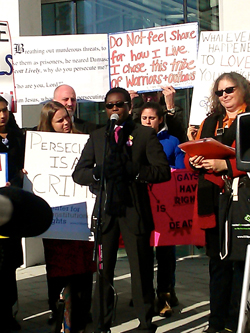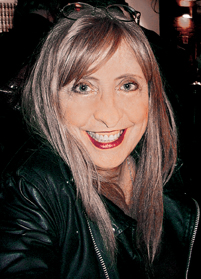
Gay rights advocates gathered on the steps of the Springfield, Mass. courthouse to protest Lively’s involvement with Uganda’s ‘Kill the Gays” bill.
Photo: Francisco White
By: Francisco L. White/TRT Reporter–
SPRINGFIELD, Mass. — District Judge Michael A. Ponsor heard arguments on Monday regarding a federal lawsuit filed in March 2012 by the Center for Constitutional Rights (CCR), on behalf of LGBTQIA organization Sexual Minorities Uganda (SMUG). The complaint alleges that Rev. Scott Lively of Abiding Truth Ministries committed crimes against humanity through persecution. Lively’s attorneys argue that the now infamous anti-gay figure, who consulted with members of Ugandan government prior to the initial introduction of what has become known as the “Kill the Gays” bill, is protected by the 1st Amendment and bears no responsibility for crimes against LGBTQI persons and their allies in the African nation.
The purpose of the hearing was to consider a motion to dismiss the complaint; the defense counsel submitted an argument based mostly on legal precedents, warning that the case “represents an unprecedented attack on the sanctity of the U.S. Constitution,” and contended that SMUG is “merely placing a conspiracy label on an attempt to vitiate the 1st Amendment.” Phillip D. Moran, the lead counsel for Lively, asked “What is Mr. Lively’s crime against humanity?” He continued, “According to SMUG, his crime is that he spoke.”
Judge Ponsor began proceedings by saying, “Like many people in this courtroom, I’ve been to Uganda. Kampala is a beautiful city in a beautiful country.” SMUG is located in Kampala, the country’s capital. Ponsor then went on to emphasize his thoughts about the case, saying, “I am concerned about the 1st Amendment issue. We all know that ours is a country committed to free speech and free expression. That includes speech we hate.” He also referred to the case as “hard” and said the free speech defense “exists at a crossroads.” He explained, “First, all groups should be treated equally. And second, we treasure, value, and revere the right to free speech.” The judge admitted, early in the hearing, “I’m frankly struggling to see the actionable behavior, beyond expression, that is the subject of the lawsuit.”
Led by Pam Spees, senior staff attorney for CCR, the plaintiff’s counsel argued that Lively is “clearly a part of the conspiracy” and “doesn’t have to have committed any crimes himself.” Spees says the persecution of the Ugandan LGBTQIA community was the “intended result” of Lively’s work. According to CCR, this case is the first Alien Tort Statute (ATS) case that seeks accountability for persecution on the basis of sexual orientation and gender identity. The statute provides the district courts with original jurisdiction of any civil action by an alien for a tort (a wrong committed willfully or negligently which results in harm) only, committed in violation of the law of nations or a treaty of the United States.
The hearing was concluded with the judge expressing his concern about an impending ruling by the U.S. Supreme Court on the Kiobel v. Royal Dutch Petroleum case, which could render ineffectual a decision in favor of the plaintiff. He spoke of there being much to consider and, again, of his concern about the 1st Amendment. Judge Ponsor also appeared moved, saying, “I respect, value, and appreciate the interest people have shown in this case.”
The line of people extending out of the federal district courthouse included people from across the state and elsewhere; they endured the cold winter morning for an opportunity to witness a hearing that Pepe Onziema, a SMUG activist, called a “historic moment.” Two additional courtrooms were used to accommodate the large crowd, with the hearing broadcast in each.
At the press conference, which immediately followed the 90 minute hearing, Onziema spoke of being excited and honored to be present. He inspired the crowd that formed outside the courthouse, less than a mile from lively’s Abiding Truth Ministries, saying, “This is not only about Uganda or LGBT [people]. This is about persecution. I know that David Kato is watching and Frank [Mugisha] is with us in spirit.” Kato, the former advocacy officer for SMUG, was suspiciously killed last year in what Uganda will not officially acknowledge as a hate crime. Mugisha was unable to attend the proceedings.
Jane Fleishman, an organizational consultant and sexuality educator who works with Springfield LGBTQIA youth group Out Now says, “In the face of Scott Lively, in the face of injustice, love will prevail.” Scott Lively, carrying a bible, made no statement and left after only staying to take a few photos.
The Center for Constitutional Rights is dedicated to advancing and protecting the rights guaranteed by the United States Constitution and the Universal Declaration of Human Rights. Founded in 1966 by attorneys who represented civil rights movements in the South, CCR is a non-profit legal and educational organization committed to the creative use of law as a positive force for social change.
Sexual Minorites Uganda is the umbrella organization of all LGBTQ organizations in the nation of Uganda. SMUG has been at the forefront of the movement to combat homophobia and persecution








More of these idiots, should be arrested and prosecuted, for it.